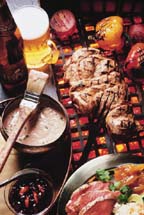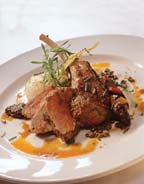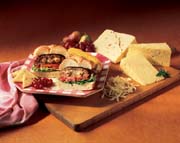

However, Midwestern foods come from a melting pot mixture of cultures that includes the Native American Indians, who introduced wild rice and corn to the area's settlers. Both grains still grow in abundance in Southern Minnesota, Iowa, Illinois and Indiana.
Strong Scandinavian influences exist in Minnesota and Wisconsin. Foods such as Swedish meatballs, herring salads and rye breads are sold in many of the small retail stores in these two states.
Germans were one of the largest immigrant groups to settle in the area, and their descendants comprise a significant portion of the citizens who live there today. In New Ulm, Minn., locals take their breweries and sausage-producing businesses seriously. Their beer- and sausage-making techniques are based on recipes handed down through generations, directly linked to the “old country,” Germany.
Here is the Beef
Beef and pork processing always have been important Midwest industries. Although the Chicago stockyards have been dismantled and gone for over 30 years, this city is still known as the meat capital of the U.S., and the National Livestock and Meat Board is based there.The high-end steak restaurant chain, Morton's of Chicago (Morton's Restaurant Group, Chicago), plays a role in assuring that high-quality beef is associated with the Windy City. Since its establishment in 1978, the chain has opened more than 65 restaurants in locations as far away as Hong Kong and Singapore. Morton's serves USDA prime, aged, Midwest grain-fed beef, shipped directly from Chicago to its restaurant locations.
Another company steeped in Midwestern tradition is Omaha Steaks (Omaha, Neb.), which continues to prosper because it has manufactured, marketed and distributed all of its own products since 1917. As of today, the business has grown to 1,800 employees. Most of the company's products are sold through mail orders. However, sales continue to increase through several areas, including foodservice, retail and restaurant channels.
Some recently introduced new products are Blue Cheese Stuffed Veal Chops (an overstuffed veal chop filled with blue cheese, herbs and garlic bread crumbs, rubbed with black peppercorns) and Braised Beef Short Ribs with Horseradish Sauce.
There also is a frozen line of side dishes, which continues to increase in sales. Mixed Vegetable Medley (whole green beans, whole baby carrots, pearl onions and mushrooms), Rice Pilaf with Mushrooms (a blend of wild and white rice with sliced mushrooms and a light beef stock) and Stuffed Baked Potatoes (whipped potatoes, real sour cream, aged cheddar cheese, bacon bits and chives), have been successful. Frozen desserts such as Key Lime Cheesecakes, Brownie Cheesecakes, Carrot Cakes and Cherry Cobblers also continue to do well.

Pork—A White Meat
The state of Iowa is considered the pork capital of the U.S. Several years ago, The National Pork Producers Council (Des Moines, Iowa), re-invented the public's perception of pork by creating a very successful slogan to promote pork products, “The Other White Meat.” Now, consumers believe that pork is not only lean, but also that it is safe to eat when the meat is handled properly.
Prairie Fresh Premium Pork (Shawnee, Kan.) recently launched a new line of seasoned, fresh pork products that offers consumers robust flavor without the hassles of preparation. The product line, which can be found in grocery stores across the country, includes three different fresh pork cuts and eight seasoning combinations. Flavors include: Peppercorn Extra Lean Pork Tenderloin, Teriyaki Extra Lean Pork Tenderloin, Honey Mustard Extra Lean Pork Loin Filet, Lemon Garlic Extra Lean Pork Loin Filet, Mesquite Lean Pork Loin Filet, Onion-Garlic Pork Shoulder Roast, Roast Flavor Pork Shoulder, and Italian-Style Pork Shoulder Roast.
Leaving the Restaurant
Former NFL Chicago Bears coach Mike Ditka, who owns Mike Ditka's Restaurant (Chicago), has taken his popular menu item, Da Pork Chop, to gourmet and specialty stores. On his restaurant menu, a double-cut pork chop (about 20oz.) is grilled 15 minutes on each side and served with warm cinnamon apples, spinach, spaetzle and green peppercorn roasted garlic au jus. On the retail market, a double-cut pork chop of approximately the same size is sold in the freezer section of gourmet and specialty stores. Ditka also has steak and hot sauce products in the grocery stores.
Although not a retail concept, Trotter's To Go (Chicago) is a takeout facility consistent with the culinary philosophy of its Mobil five-star restaurant, owned by famed chef Charlie Trotter. Trotter's To Go offers takeout food prepared fresh daily, and claims to use only the freshest, seasonable ingredients available to prepare salads, soups, sandwiches, entrées and bakery desserts. Some signature Midwestern retail foods sold at Trotter's To Go are: Whole Lavender and Honey Glazed Amish Chickens, Maytag Blue Cheese Polenta, Free Range Chicken Pot Pies and Roasted Root Vegetables, and Grilled Organic Pork Chops with Applesauce.

America's Dairy Capital
Wisconsin is the largest cheese-producing state in the U.S., with more than 120 dairy plants in operation. The state is the world's fifth largest cheese-producing region, and produced 1.1 million tons of cheese in 2002, according to the U.S. Department of Agriculture (Washington).Organic Valley Family of Farms (Lafarge, Wis.) started its business in 1978 by forming a group of small organic farms to produce cheese, milk, cream, butter and eggs. Now, the company has expanded into the meat and poultry business. Some new products are Italian Chicken Sausages, Pork Brats and Hardwood Smoked Bacon. All products are produced and sold as 100% certified organic.
The Midwest is steeped in old traditions, and many of its foods are simple fare that satisfy by being comforting and familiar. This basic cuisine can inspire many foods that also will be welcomed by other Americans.
Website Resources:
www.mortons.com — Morton's of Chicago, Morton's Restaurant Groupwww.charlietrotters.com — Trotter's To Go
http://abcnews.go.com/sections/business/Living/elitemeat_030715_csm.html — Article on certified organic meats
www.nppc.org/about/index.html — National Pork Producers Council